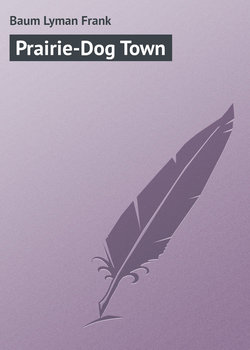Читать книгу Prairie-Dog Town - Baum Lyman Frank, Lyman Frank Baum, Edith Van Dyne - Страница 1
Chapter I
The Picnic
ОглавлениеOn the great western prairies of Dakota is a little town called Edgeley, because it is on the edge of civilization – a very big word which means some folks have found a better way to live than other folks. The Edgeley people have a good way to live, for there are almost seventeen wooden houses there, and among them is a school-house, a church, a store and a blacksmith-shop. If people walked out their front doors they were upon the little street; if they walked out the back doors they were on the broad prairies. That was why Twinkle, who was a farmer's little girl, lived so near the town that she could easily walk to school.
She was a pretty, rosy-cheeked little thing, with long, fluffy hair, and big round eyes that everybody smiled into when they saw them. It was hard to keep that fluffy hair from getting tangled; so mamma used to tie it in the back with a big, broad ribbon. And Twinkle wore calico slips for school days and gingham dresses when she wanted to "dress up" or look especially nice. And to keep the sun from spotting her face with freckles, she wore sunbonnets made of the same goods as her dresses.
Twinkle's best chum was a little boy[Pg 7][Pg 8] called Chubbins, who was the only child of the tired-faced school-teacher. Chubbins was about as old as Twinkle; but he wasn't so tall and slender for his age as she was, being short and rather fat. The hair on his little round head was cut close, and he usually wore a shirt-waist and "knickers," with a wide straw hat on the back of his head. Chubbins's face was very solemn. He never said many words when grown folks were around, but he could talk fast enough when he and Twinkle were playing together alone.
Well, one Saturday the school had a picnic, and Twinkle and Chubbins both went. On the Dakota prairies there are no shade-trees at all, and very little water except what they get by boring deep holes in the ground; so you may wonder where the people could possibly have a picnic. But about three miles from the town a little stream of water (which they called a "river," but we would call only a brook) ran slow and muddy across the prairie; and where the road crossed it a flat bridge had been built. If you climbed down the banks of the river you would find a nice shady place under the wooden bridge; and so here it was that the picnics were held.
All the village went to the picnic, and they started bright and early in the morning, with horses and farm-wagons, and baskets full of good things to eat, and soon arrived at the bridge.
There was room enough in its shade for all to be comfortable; so they unhitched the horses and carried the baskets to the river bank, and began to laugh and be as merry as they could.
Twinkle and Chubbins, however, didn't care much for the shade of the bridge. This was a strange place to them, so they decided to explore it and see if it was any different from any other part of the prairie. Without telling anybody where they were going, they took hold of hands and trotted across the bridge and away into the plains on the other side.
The ground here wasn't flat, but had long rolls to it, like big waves on the ocean, so that as soon as the little girl and boy had climbed over the top of the first wave, or hill, those by the river lost sight of them.
They saw nothing but grass in the first hollow, but there was another hill just beyond, so they kept going, and climbed over that too. And now they found, lying in the second hollow, one of the most curious sights that the western prairies afford.
"What is it?" asked Chubbins, wonderingly.
"Why, it's a Prairie-Dog Town," said Twinkle.
